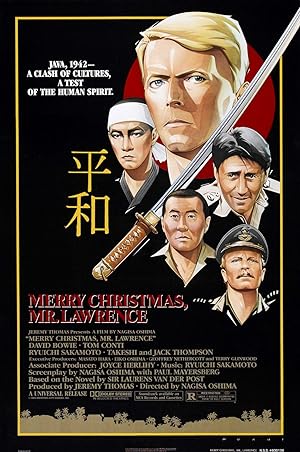Merry Christmas Mr. Lawrence may be the best movie that I may not fully understand. Shockingly, the titular character is NOT David Bowie’s character. Even though David Bowie plays a pivotal character, he is not the main character who appears throughout the entire movie. There is explicit reference to tertiary opposing soldiers engaging in sexual intercourse so when a Japanese soldier inexplicably tries to save and is (understandably) obsessed by Bowie, a rebellious British POW who vaguely reminded me of what The Little Prince would look like if he got older, I immediately read a homoerotic unfulfilled attraction, but I could be wrong, and it could have been soldiers admiring each other’s grit. Merry Christmas Mr. Lawrence examines how the complexities of British and Japanese military cultures; how they differ and clash in a foreign environment; how they are affected by other personal experiences such as past events, traditions, class. So Merry Christmas Mr. Lawrence not only depicts how concepts get lost in translation, but also recreates that feeling in the viewers. The only ones who may really know what is going on are the film creators and the author of the books that the movie is based on. I know that many viewers may find the depictions of the atrocities committed by the Japanese against POWs in WWII to be shocking, but I was surprised by how the film tried to create parallels and be understanding instead of demonizing the Japanese soldiers. While I applaud that approach, after reading First Into Nagasaki: The Censored Eyewitness Dispatches on Post-Atomic Japan and Its Prisoners of War by George Weller, I think that Merry Christmas Mr. Lawrence should have pulled less punches in the depiction of the atrocities while still showing how soldiers from both sides can be trapped, manipulated and products of their culture. To be fair, the information about those atrocities may not have been widely available since many survivors did not like to talk about it.





